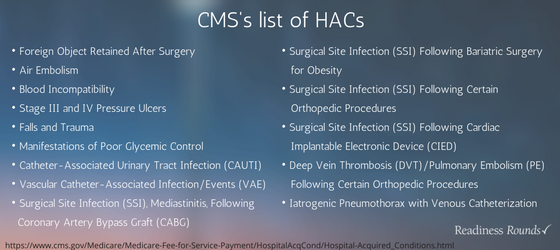The 5 Key Metrics That Drive High Reliability
In this series, we are exploring 5 key metrics that both drive a hospital towards high reliability but will also give an ROI on performance improvement initiatives beyond the initial financial investments.
Today, we are talking about HAC scores, read the first installment of the series here:
#2. Reducing Hospital Acquired Conditions (HACs)
The Hospital Acquired Conditions Reduction Program penalizes hospitals approximately $350 million every year. Obviously, taking money away from hospitals makes it harder for them to function. CMS currently lists the following categories of HACs:

source: CMS.gov
There are several ways hospitals can reduce HACs to improve patient care and to minimize HAC penalties.
So, how can your hospitals lower its HAC rates?
1. Upgrade to a digital rounding solution
Using a single digital high reliability platform to collect quality observations offers numerous benefits:
- Streamlines the effort to collect and aggregate data
- Identifies issues for performance improvement
- Allows executive leadership to quickly determine if performance improvement projects are having the desired effect
- Allows regulatory compliance to become a byproduct of proactive checking
- Makes the goal of High Reliability feasible
TIP: Implement consistent system-wide safety protocols, then proactively round on them. Routine digital rounding helps to prevent events from occuring, but will also build a database of information from which you can find actual systematic issues upon which you can build performance improvement efforts against.
2. Implement Quality Measures
Ideally, these measures will include:
- A digital process that ensures that key elements of care regarding infection prevention are consistent throughout the facility
- Systematic observation of actual nursing practices and infection prevention and control practices in a format that allows assessment of success
- Aggregation of data so trends can be identified and addressed
TIP: Reduction of HACs is not just a nursing responsibility. It is a hospital-wide responsibility.
3. Strict Adherence to Safety Protocols
Ideally, these measures will include:
- Proper assessment of patients at higher risk for HACs
- Regular checks on patients at risk
- Constant maintenence of a safe environment
- Conduct internal process assessments
- Create a culture of safety
TIP: Regular and consistent rounding and reporting on safety protocols with a tool that aggregates data and measures effectiveness of safety measures is a necessity. The volume of essential checks will overwhelm any manual system.
4. Education on Safety Protocols
- Educate patients and family members about safety issues
- Educate employees about appropriate infection prevention and control precautions
- Review emerging safety findings from medical journals to identify and implement best practices
- Train staff to communicate effectively as a team
- Utilize a competency checklist for nurses
- Utilize safety checklists
This is best implemented when using a solution that sends real-time issues to appropriate contacts. This type of follow-up process ensures that no issues fall through the cracks.
TIP: Everyone in the hospital must know their responsibility as it pertains to patient safety. Teach and remind regularly.
We will continue to explore the ways in which each of these metrics can offer return on investments in upcoming blog posts...
The Remaining Key Metrics That Drive High Reliability:
Download the FREE eBook, How to Achieve ROI from High Reliability Initiatives, today.
